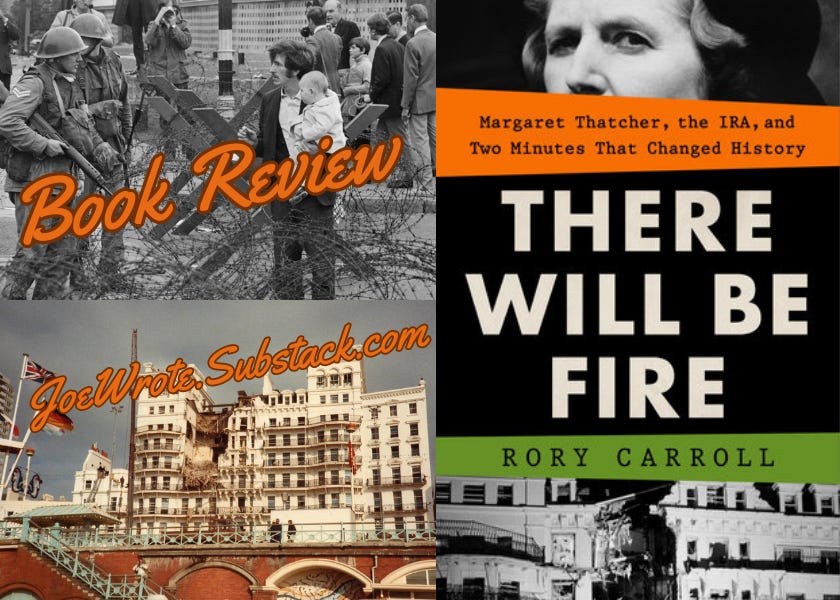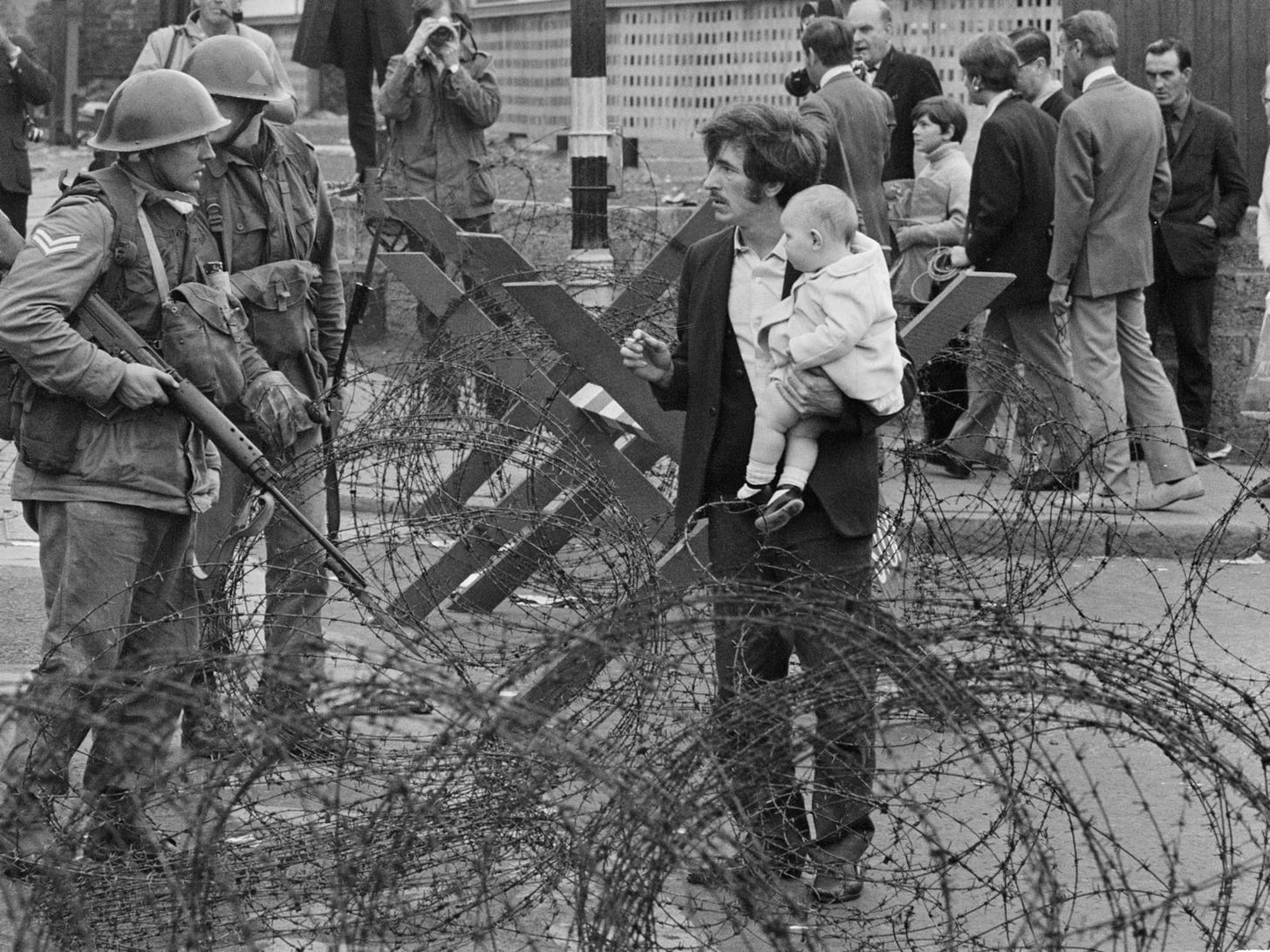[Book Review] There Will Be Fire: Margaret Thatcher, the IRA, and Two Minutes That Changed History
A thrilling story with excellent writing, bogged down by a one-sided version of history.
Welcome to JoeWrote! If you appreciate my work, please consider a premium subscription. For just $30 a year — that’s less than a quarter per article — you can unlock everything JoeWrote has to offer and ensure I am able to continue creating this content.
Thank you for your support! In Solidarity,
Joe
With the sectarian violence in Northern Ireland having simmered over two decades ago, the conflict has gone from one of global attention to a footnote of history. Millennials and Gen Zers who grew up in the 9/11 era are familiar with the wars in Iraq and Afghanistan, their causes, consequences, and participants, but would need the aid of Google to know who Gerry Adams or Bobby Sands is. Coyly dubbed “The Troubles,” the 30-year period of violent conflict surrounding the British occupation of Northern Ireland is relatively unknown amongst younger generations, making its stories excellent subject matter, as they are filled with the tales of spy craft and deceit that make historical accounts read like espionage thrillers.
Rory Carroll’s There Will Be Fire zooms in on one specific event of The Troubles, the Irish Republican Army’s bombing of the Grand Hotel in Brighton, England that almost killed British Prime Minister Margaret Thatcher. The book follows the life and account of the bomber Patrick Magee, his target Thatcher, and the numerous British police agencies trying to catch him. Where the book thrives is in its detailed reporting, which, with much skill from Carroll, caries the tension of a blockbuster thriller. Carroll is a talented writer, describing the act of bomb-making and defusing as a walk on the razor’s edge. Readers will feel the “eureka” moments of discovery along with the police agents, which come after months of sifting through mugshots and manually comparing fingerprints.
But while the storytelling is superb, There Will Be Fire fails in its lack of context and unexplained causes of The Troubles and the motivations of its participants. The book spends a lot of time with Margaret Thatcher, detailing her rise through the Conservative Party to become the first female Prime Minister. It’s clear Carroll is fond of her, as she is portrayed as a stern, unwavering force, undeterred by Irish bombs or English sexism. Unfortunately, no such exposure is provided for Patrick Magee or his compatriots. Besides a brief exploration of Magee’s family life, Carroll omits any explanation of why he, or any others, joined the Irish Republican Army. (Or, why the IRA existed in the first place.) While Thatcher is lauded for her heroism, the lack of provided motivations for those trying to kill her leaves the impression that the Republicans (people who want a united Ireland free from British rule) simply “hate the Brits” and “enjoy killing.” In reality, the reasons for Irish Republicanism, both militant and pacifist, are much more nuanced.
Ireland suffered over 800 years of English colonialism, with a reprieve for the southern part of the nation coming in the early 20th century. The six counties of the north, which are still considered British territory, became a hotbed for Britain’s anti-Catholic prejudice, state violence, and all-out murder. Never does There Will Be Fire mention the many institutionalized prejudices the British government imposed on Catholics, such as voting restrictions, forced unemployment, and “internment,” the process of imprisoning “suspected” Republicans without trial. It borders on malpractice that Carroll never includes Bloody Sunday, when British paratroopers shot 26 unarmed civil rights marchers, as a catalyst for Irish armed resistance. He also omits the extent torture was used on Irish prisoners, the British government’s use of military and paramilitary death squads, and Margaret Thatcher’s attempt to get the Ulster Volunteer Force, the pro-British counterpart of the IRA, to assassinate the President of Ireland. Instead, the reader is given a rosy picture of “The Iron Lady,” one that her Conservative Party biographer could have written.
In not providing the proper context for Magee’s actions, Carroll fails his readers by giving the impression The Troubles could be boiled down to “good vs. evil.” In actuality, both the IRA and the British government have apologized for their actions on numerous occasions. Not only does a one-sided depiction not provide the full story of The Troubles, but it is dangerous. To avoid future conflicts, in Northern Ireland and elsewhere, we must properly understand what drives someone to plant a bomb or torture a prisoner. Only with a thorough understanding of others’ reasonings can we prevent violence. Carroll’s account fails in this, as it misleads its readership into thinking there are “good guys” (Thatcher) and there are “bad guys” (Magee). Through that lens, humans will continue to misunderstand each other, and conflict will follow.
Though the prose is superb and the story is worthy of exploration, the half-tale of There Will Be Fire severely limits the book’s potential. I give it 2.5 stars and would steer anyone interested in learning about the entirety of The Trouble to read Say Nothing instead.
If you enjoyed what you just read, you can help JoeWrote grow by liking (click the ❤️ button at the top), sharing (below), subscribing, or referring a friend. Every reader you refer earns you points in the referral program, which gets you free access and exclusive merch.






This and the Clinton article you wrote I feel really drive at a facet of the neoliberal/liberal conservative geopolitical mindset: informed ignorance.
They speak a slew of details, but at the end of the day they can only view conflicts as good vs evil. The reasons behind the conflict are left as an intrinsic nature of the two parties. Good will resist evil, evil will attack good. They fail to understand that these conflicts are almost always way more complicated. It’s why Iraq went from a pseudo-ally during the Iraq-Iran conflicts to our enemy in desert storm. Same with the Mujahideen/Al Qaeda.
This encapsulates why I like to read (or listen to) at least 3 biographies before I really feel like I understand a person, and at least 5 different news stories about the same event. Sometimes there are unintentional omissions, even without an agenda.. and then, of course, there are also agendas.